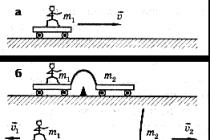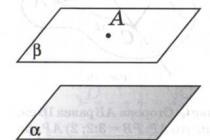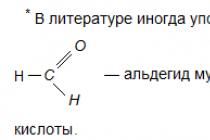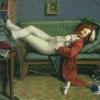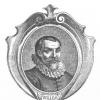Innocent charms full
In the eyes of the parents she
Bloomed like a valley hidden
Damed in the Grass Deaf
Neither by moths nor bee (V, p.39).
Olga - Eternal Child, completely deprived of development:
Always modest, always obedient,
Always as the morning cheerful
As the life of the poet is simple
As a kiss of Love Mila ... (v. P. 40).
Even frankly attacks the similarity in the heroine portraits. This is how Maria is described:
All in it captivated: a quiet temper,
Movement Slender, Live
And the eyes of languid-blue (IV, p. 135-136).
And so Olga:
Eyes like blue sky;
All in Olga ... (V, P.40).
True, there is one sharply contrasting detail. Maria - Artistic Nature:
Nature cute dars
She decorated with art;
She is homemade pies
Magic harp animated ... (IV, p. 136).
Olga is absolutely deaf to art:
Fan of glory and freedoms
In the excitement of the stormy dooms of his
Vladimir and wrote OD
Yes, Olga did not read them (V, p.79).
She does not mind only when her fiance "the volatile leafles of the album diligently adorns her ..." (V, p.76). Alas, the description of the drawings and records of Lensky suggests that they fully correspond to the genre Description of a particular album immediately goes into a description of the sample album of the county ladies.
Of course, in art there are no random details: the poetry of Mary and Deafness to Olga poetry affect the general attitude towards them. Nevertheless, it's not about the details, but in the pathos of the narration: the details can act as motivation, but Paphos would take place without motivation. High note in the image of Mary is sustained consistently. Successful words to Olga - compliments that can be canceled, and so sharply, which is projected to the image of Mary. Portrait of Olga is not completed and interrupted by a meaningful reservation:
... but any novel
Take and find true
Her portrait: He is very nice,
I loved him before,
But he was tired of immensely (V, p.40).
What "before"? In just completed poem! And as determinedly stated: "He tired ...". Just unbelieveble!
How to explain the detected paradox? Maybe the feature of the Pushkin Psychology of Creativity is triggered: Having finished the work, the poet feels the need to free themselves from the vague of the images in the world he lived, and reaches it with the help of humor. This applies to the zarem. Vyazemsky, who published the poem, did not like the epithet "stinging lobsanya". Pushkin did not objected to the replacement to "piercing", explaining: "It will be new. The fact is that my Georgian bites, and it must certainly be known to the public "(X, P.62). If the passion of the heroine is only that it bites, it arises a comic shade. But Zarema is truly a passionate woman, the image is tragic; A fun comment reduces its image. It is characteristic that irony in the address of the drill sounded only in an intimate letter to a friend, whereas the ironic decline in Portraits of Mary-Olga was publicly implemented; The first is nothing more than a joke, the second is serious.
Maybe Pushkin as an artist is dissatisfied with Mary and therefore parody reduces it? The basis for this version is available to "any novel". Only if it is not added to the answer, the clarity is not added, because a new question arises: why Pushkin in the portrait of the heroine was satisfied with the template features and did not find the features of the original. And we return to the original: antithesis of the Heroine, very important in the poem's image system, no in the heart of the poet, and even more - the charming person who has long worried the imagination of the poet and demanded victims from him, given more heart heat. As if there were no numerous renunciations, the image with the new force owns the consciousness of the poet. But the image of the humility is indicated as an idea, but is described only by "borrowed" features, only contour. Pushkin successfully covered the emptiness of the image; They are not visible because we look at Maria not with our own eyes, but the eyes of the characters. The essence does not change from this: speculative Pushkin is quite aware of the meaning of spirituality in a woman, but the idea did not immediately be able to become a heart idea. However, I had to wait quite a bit.
Olga is one of the paramount heroines of Roman in verses "Eugene Onegin". For the first time on the pages of the novel, we meet with Olga not directly, but through the perception of an elevated, noble, romantic Lensky.
Oh, he loved how in our summer
No longer love; As one
Mad essence human poet
Still loved condemned ...
The fact that Olga was the subject of the love of a young poet, already anticipate the appearance of beautiful light images. "He was a witness defeated her infant fun," he held with her the best moments of his life and in the public consciousness was considered a bridegroom.
Innocent charms full
In the eyes of the parents, she
Bloomed like lily of the valley, hidden,
Damed in the Grass Deaf
Neither by moths nor a bee.
It would seem that the poet admires the purity, the immediacy and charm of the heroine, as admiring the innocent charm of the undisclosed bud, which promises to turn into a wonderful dazzling flower:
Eyes like sky, blue,
Smile, linen curls,
Movement, sound, light mill,
All in Olga ... But any novel
Take and find, right,
Her portrait: He is very nice,
I loved him before,
But he tired of me immensely.
A. S. Pushkin drew a magnificent portrait of flawless beauty, but still does not consider it a model of perfection, the subject of copyright and admiration. What is confused by the poet? What disadvantages we see in this reference of female beauty? The author acknowledges that he himself was worshiped by a similar heroine to girls in his youthful verses, but they are tired of immensely. We find a rays in the first, direct assessment of the favorite hero A.S. Pushkin Onegin. The view of this sophisticated life of the hero, not distorted by the same subjective perception of a loving person, perceives the subject of Lensky's adorations cold and rigidly, without a flier of romantic poet's enthusiasm:
In terms of Olga there is no.
Pottop-in-pin in Vandikova Madona:
Round, red face she,
Like this stupid moon
On this stupid sky.
Onegin is unlikely to emerge the portrait of the heroine, but he stressed the lack of a feeling from the impeccable appearance of Olga: the lack of harmony between the beautiful appearance and the poverty of the inner world, the poverty of the spiritual life, illuminating the appearance of the light of spiritual fire, the peculiarity of the personality, painfully and tirelessly seeking his place in life. The lack of life in the features of Olga is a consequence of confusion, unconfluousness, consumer attitude towards the outside world, complacency and limitedness.
Onegin, of course, is unnecessarily stinging and critical, and his perception of Olga's image cannot be recognized objective. Olga is simple and immediately, flirting and playing, surface and carefree, full of vital energy and thirst for pleasure, worship, holiday. She is susceptible to praise as any lady, so it was so easily managed to take her attention to her attention to the Ball of Larina:
Agile
Onegin with Olga went;
Leads her, sliding casually,
And leaning, she whispers gently
Some vulgar madrigan,
And the hand of taught - and lasted
In her face proud
Rushenets brighter.
Carelessly rejects Olga signs of attention Lensky, motivating this promise to dance with Onegin. Of course, this is not a manifestation of female tricks and variability, as in the seizure of jealousy, he considers her young. Just external signs of attention, as well as the attributes of life, in general, by virtue of its spiritual undevelopment playing for her an important role than the genuine movements of the soul. When the rheuble, flaming jealousy Lensky before the duel, he could not resist the temptation from the temptation, wanting to fight her with a surprise of his appearance, she, "like windy hope, handing out, careless, fun," in childish it took an opportunity, why he unexpectedly disappeared from the ball .
All feelings in Lensky climbed,
And he silently hung his nose.
Jealousy and annoyance disappeared
Before this clarity of the view,
Before this gentle simpleness,
Before this drawing soul! ..
And the Lensky who repented in his stupid suspicions had already felt happy. But nevertheless Olga did not love him so selflessly, incense, as the poet himself, as he imagined a true feeling. She did not deceive Lensky, she is simply not capable of deep, aging in the depths of the soul feeling, but perceives it only as an external manifestation of attachment, like a beautiful ritual of traditional self-expression.
After the tragic death - because of her - Lensky Olga briefly grieved and soon fascinated by the Ulan, who "managed to put her suffering to the love lasty":
And so with him before altar
She is shy under the crown
Stands with a drooping head,
With fire in full eyes,
With a smile easy on the mouth.
In the image of Olga A. S. Pushkin embodied one of the female types - a beautiful, charming woman, playful, fun, carefree. Coquetty is its distinctive feature. Olga is not taller, but natural. If you add to all the above qualities, the surfaceness of the perception and ease of judgments, it will turn out the most common ladies' image, quite attractive, but not sufficiently solid.
Hello dear.
We continue with you the analysis of "Eugene Onegin". At the previous time we stopped here:
So....
Slightly, Olga Captured,
Heart torment still without knowing
He was the witness
Her infant fun;
In the shadow of the custody
He shared her fun
And children referred the crowns
Friends neighbors, their fathers.
In the wilderness, under the silence of humble
Innocent charms full
In the eyes of the parents, she
Bloomed like lily of the valley hidden
Deaf
Neither by moths nor a bee.
Here, for the first time, the representative of the Larina family - the youngest Olga, in which Lensky is in love with childhood, and those who have reflected marriage. Fortunately, neighbors
Olga Larina
She presented a poet
Young enthusiasm first dream
And the thought about her eyelids
His grip first moan.
Sorry, Gold games!
He fell in love thick,
Privacy, silence,
And night, and stars, and moon,
Moon, Heavenly Lampada,
Which we were dedicated
Walking Environments Evening Darkness,
And tears, secret torment Pobed ...
But now we see only in it
Replace the dull lamps.
In general, the guy suffered. Sugged alone at the moon. Idiilia and romanticism :-) This is even deeper emphasizes the mention of the chassis. This is not what you thought about the first second is such an old brave instrument, and in this specifically, a sort of idyllic poetry symbol. But "young enthusiasm first sleep" is exactly something - probably pollutions :-))
Tsevnitsa
Always modest, always obedient,
Always as the morning cheerful
As the life of the poet is simple
As a kiss of love Mila,
Eyes like blue sky;
Smile, linen curls,
Movement, voice, light mill,
All in Olga ... But any novel
Take and find true
Her portrait: He is very nice,
I loved him before,
But he tired of me immensely.
Let me, my reader,
To do older sister.
Olga and Vladimir
Not very so the author speaks well about Olga. Singing a nice blonde, pleasant in all respects, but empty, which means that boring. I think, few girls would be delighted by reading such a derogatory characteristic. However, Pushkin is stipulated, which he himself was fond of themselves like such ladies, but they were already very bored. But still, as it is even a little offensive for Olga :-)
Her sister was called Tatiana ...
For the first time named
Pages tender novel
We will delightly consecrate.
And what? It is pleasant, sonorous;
But with him, I know idle
Starry memories
Ile Giroby! We must all
Admit: to taste very little
We and in our names
(Do not talk about verses);
We are not an enlightenment
And we got from him
Chewing, - nothing else.
Tadam! The second main character of this wonderful novel in verses appears - the older sister of Tatyana Larina. She was older than Olga for a year and she should be about 18 years old. Pushkin notes. What is an old one, which means that the name is not very popular at the time. They were rarely called noble girls. Interestingly, after the publication of the novel, the situation has changed to the opposite :-)) the name means the organizer, the founder, the lady establishes, set, appointed.
So, she was called Tatiana.
Neither the beauty of his sister,
Neither the freshness of her ruddy
She did not attract any eyes.
Dick, sad, silent,
Like lan forest fearless
She in the family of his native
He seemed to be a girl alone.
She can't guess
To his father or his mother;
Child itself, in the crowd of children
Play and jump did not want
And often all day one
Some sat silently at the window.
Again, a strange thing. Here the author seems to believe that Tatiana is less appearance is attractive, and at all "Dick" than Olga (and who can like it from the girls), but from the first lines it is clear that she is more cute to him. More interesting, deeper, it has a mystery that races inside passion.
Pensiveness, her girlfriend
From the most lulled days
The flow of rural leisure
Dreams decorated to her.
Her ramp fingers
Did not know the needle; Based on the hoop,
Silk Pattern She.
Did not revive the canvas.
Hunting to rule the sign
With obedient child duck
Prepass joking
To the decency, the law of light,
And it is important to repeat her
Mominka's lessons.
But dolls even during these years
Tatiana did not take her hands;
Pro Serie, about fashion
There were no conversations with her.
And there were children's leprosy
Her alien; Scary stories
Winter in the dark night
Polished more heart to her.
When the nanny collected
For Olga on a wide meadow
All the little her friends,
She did not play in the burner
She was bored and a ringing laughter,
And the noise of their windy jeads.
Neither embroidery, nor games, no toys, but stories (all the more horror stories) she is more interesting. She is loner. Loves to reflect and follow the life from the side.
Elizabeth Xherevna Vorontsova is one of the possible prototypes of Tatiana Larina.
She loved on the balcony
Warn score sunrise
When on the pale sky
Stars disappear rounds,
And quiet the edge of the earth brightens,
And, Morning Herald, the wind blows,
And he boosts gradually day.
Winter when night shadow
Polimir share has
And share in celebrating silence,
With an derived moon,
East lazy reveals
In the usual hour awaken
She got up with candles she.
She was too early to novels;
They replaced her all;
She fell in love with cheating
And Richardson and Rousseau.
Her father was kind small
In the past century, a belated;
But the books did not see harm;
He never read
They read a blank toy
And did not care about
What daughter is a secret volume
Dreamed until morning under the pillow.
My wife was herself
From Richardson crazy about Richardson.
S. Richardson
Early began to read, the benefit of Papape did not forbade, and Maama on some books looked benevolently. I do not know, truth, why the young girl Rousseau, but with Samuel Richardson everything is clear :-) I don't care about the "sensitive" literature of the XVIII and early XIX centuries. I think the most popular ladies' novel of that time was his "Clarissa, or the story of the young lady"
She loved Richardson
Not because to read
Not because the grandison
She preferred to Lovlas;
But in the old princess Alina,
Her Moscow Cousin,
He often told her about them.
At that time was still the groom
Her spouse, but in captivity;
She sighed about the friend
Which heart and mind
She liked much more:
This Grandison was Nice Frant,
Player and Guard Sergeant.
Sir Charles Gradinson
True, the explanation immediately, why Tatyana loved Richardson .... Ordinary women's things, inspired by older and experienced cousin. Moscow Kuzina Alina, which still flashes on the pages of the novel afterwards. In general, Moscow Kuzina is a steady satirical mask, a compound of provincial scope and manners of that time. But we are not talking about. Alina favorably took care of her future husband, but dreamed of friend - Frant and Guard. Let you do not bother the title - in the guard served noblemen, just her hero was still young.
Well, finally, you need to mention, lines " what is not because Grandison / She preferred"The first - hero of the impeccable virtue, the second - insidious, but charming evil. The names of them became nominal and taken from Richardson's novels.
To be continued...
Have a good day.
Slightly, Olga Captured,
Heart torment still without knowing
He was the witness
Her infant fun;
In the shadow of the custody
He shared her fun
And children referred the crowns
Friends-neighbors, their fathers.
In the wilderness, under the silence of humble
Innocent charms full
In the eyes of the parents, she
Bloomed like lily of the valley hidden
Deaf
Neither by moths nor a bee.
It is known that in the epoch EO name Tatiana was not popular, and the fact that Pushkin chose him for his heroine was unusual. But after all, and named Olga is not all right, see how unusually Pushkin introduces him to the novel:
"A little fat, Olga Captive"
What Olga? What for Olga? Which Olga? This is where about this Olga before?
Pushkin with his own name, goes like with a nonene! "Some kind" Olga ". "Some" Colombin ". "Captive to the next" Olga ". How else can you understand such an input?
How to know, - turning attention to this as the same Vyazemsky, there is a brilliant Bon ILO about "Olga", this "Olga" gets like a type in the promotion - it would not be whether this name would have been injured in the insignificance to the same extent as the name Tatiana From this insignificance extracted?
"Tatiana" is something romantic, young, sincere.
"Olga" - pretending to her name
And later only sighed:
"What price he bought the right,
Opportunity or grace
Over all so wisely and slyly
Joke, mysteriously silent ... "
"And Olga" Olga "call"
With the image of Olga, the wild-growing plants of the middle strip of flax and the valley are also connected:
In the wilderness, under the silence of humble
Innocent charms full
In the eyes of the parents she
Bloomed like a valley hidden
Dogged in the grass thick
Neither by moths nor a bee.
"Eugene Onegin". GL II. P. XXI.
Eyes like sky, blue,
Smile, linen curls ...
"Eugene Onegin". GL II. P. XXIII.
Bouquet "Hyacinth and Lily of Lily", meaning "Return of happiness and favorableness." Colored engraving P. Bezessee from the manual "Flower language" (Paris, 1819)
Lily of Lily - a symbol of virginity, modesty, tenderness, flax - simplicity. A gentle girl with blue eyes and blond hair was the main character of the Pushkinian time of the works of J.-zh. Rousseau, Karamzin, Bestumeva. The epithet "linen" when describing the appearance of Olga, it is thought, not accidental: he not only talks about the color of hair 20, but also hints on the mental simplicity and naivety girl, and also emphasizes the alternation of the character. Lily of Lily, Lily and "Two-Try Flower" - Florial Emblems 21 Olga. You can add flax to them.
A comparison of the adorable girl with the Lily of the Lily again meets Pushkin in the sketch of the beginning of the poem "Bova", which speaks about the daughter of the king Zenziev:
She is sweet as Lily of May,
Rubbing like Lan Caucasian Mountains.
To the lily of the Lily of the symbolic meaning is close to the violet, denoting modesty, chaste, the maidity. In apologakh I.I. Dmitrieva, published in 1825, challenges the humble and quiet life of a metaphorical violet, growing between a pink bush and burdens. In 1826, in Mikhailovsky, with the participation of Pushkin, the "moral quartewings" was composed - witty and pretty wise parodies on Dmitriev's apologists. In the quatraisses of the "law of nature" such tremendous advantages of metaphorical violets, as modesty and prettyness are underlined:
Violet in the air is their fragrance lila
And the wolf hared in the oxidian people;
He was blood-blooded, a violet - Mila:
Everything follows by its nature.
As the element of the landscape of the valley and the violet are hammer in the poem of Pushkin "Town" (1815). The poet describes his "Garden cheerful",
Where linden nurses are
With a cherry bloom,
Where I'm half a day
Birrozok Dark Vaults
Cool the Sen give,
Where the lily of the belly snow
Slept with a choir violet,
And fast rod,
In jets carrying a flower,
Invisible to the gaze
Sleeping at the fence ...

Vasilka and marigolds.
Figure in the album ate. N. Ushakova. L. 5.
"Cheerful garden" inspired by the scenery of the village of Zakharov, where the poet spent the summer with a little child. Plants here are real, not metaphorical, but their "bouquet" creates the impression of youth, beauty, purity and joyful mood.
In the "moral quatrains" is mentioned another field flower:
In rye was Vasileuk beautiful,
He is in the spring, in the summer bloom
And finally faded in the fall of the autumn rarely.
Here is the mortal goal!
In Russian folk poetry, Vasileuk symbolizes a beautiful young man or a girl, and rye is well-being, wealth. However, a folk symbolism is unlikely to be used in this parody poem of Pushkin and Language. Without loss of sense, any flower or a plant with a long period of flowering could be on the site of cornflower.


